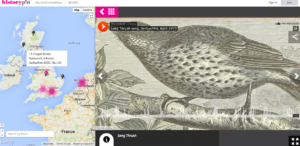I’m excited to have a chance to facilitate the 3rd International Linked Open Data in Library, Archives & Museums Summit (LODLAM) in Sydney 29-30 June, 2015. As part of it, I want to debut a sneak peek into some linked data work our team is doing together with Europeana.
The idea is to address the challenge of “roundtripping of data,” when projects like Historypin are able to provide community enrichment to institutional collections and institutions can in turn ingest those enrichments and comments. A lot of this is looking at using Linked Data to improve upon or provide an alternative to OAI-PMH, which is more in tune with methods that can be used by web developers at large.
In our case, we have created an API to allow access to annotations on our site (other APIs in the works), and we’ve utilized Open Annotation and JSONLD to make this available to Europeana to harvest and ingest back into their records.
1. users annotate or enrich the records
2. this data is expressed using OA and JSON-LD
3. Europeana has created a query tool which will not just be for us eventually, in which they request annotations within a certain time window.
This shows the source, and then the transformation which maps it to the Europeana Data Model, and finally a response from the query about whether or not this has been written to Europeana.




